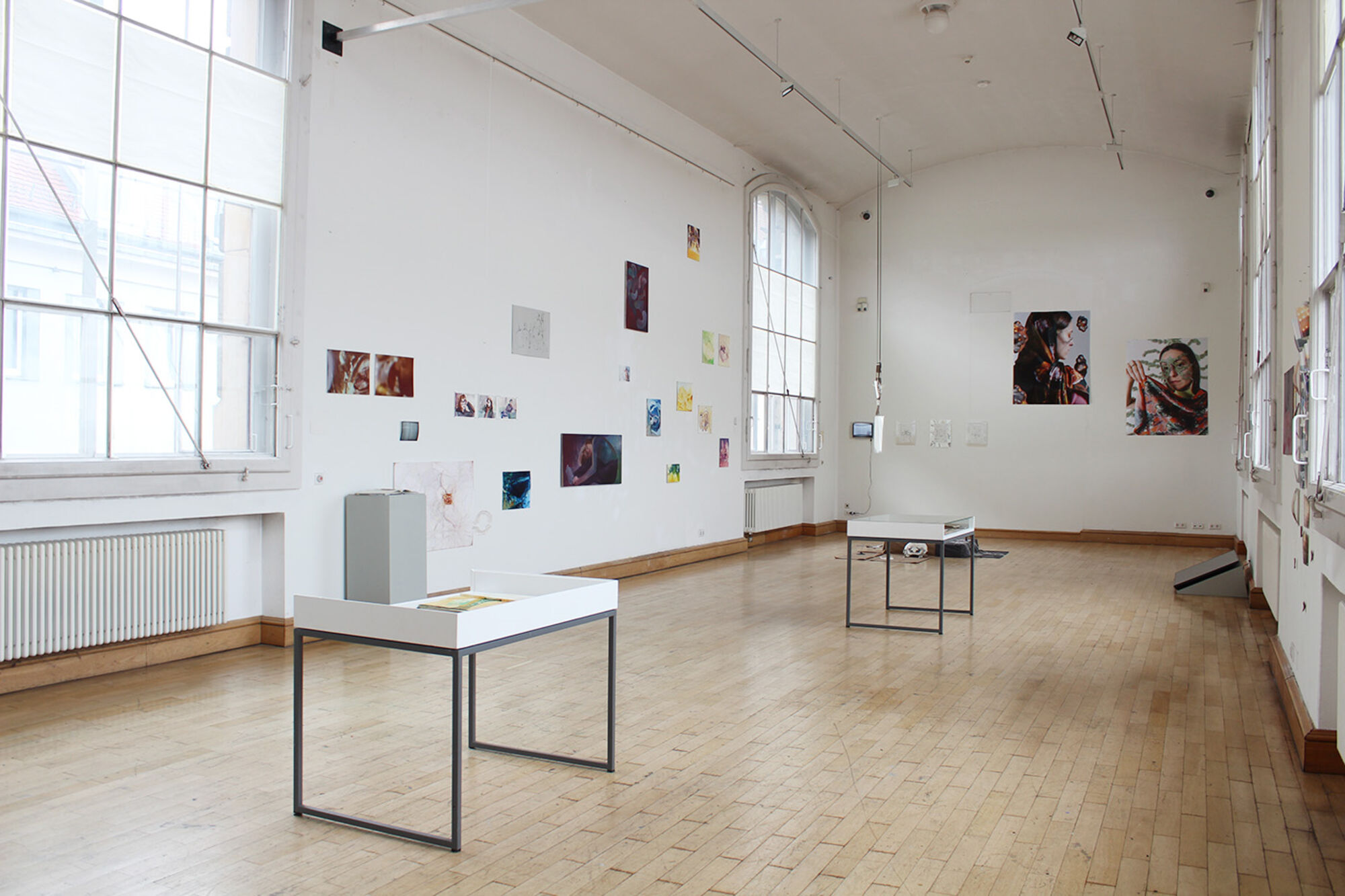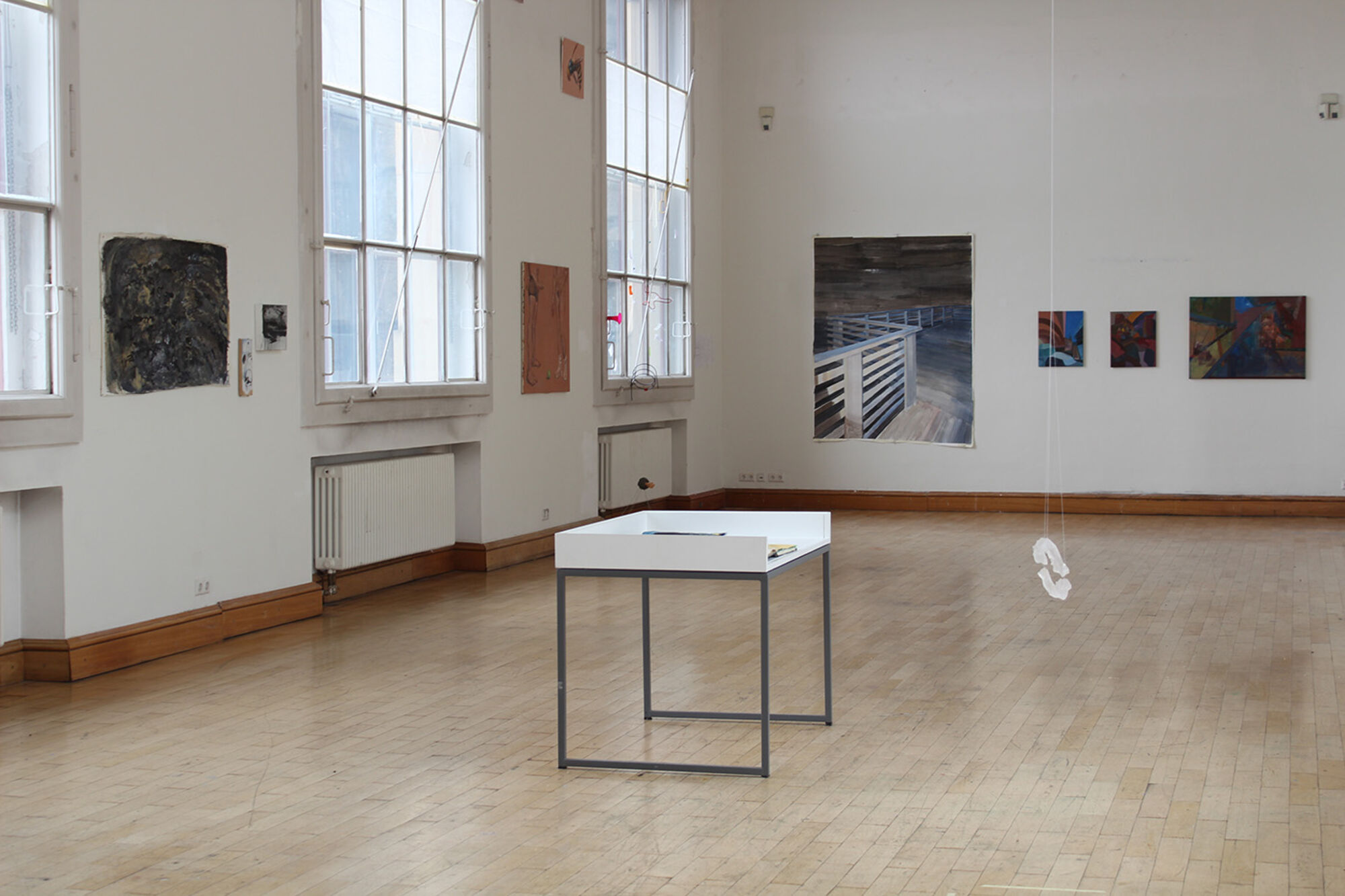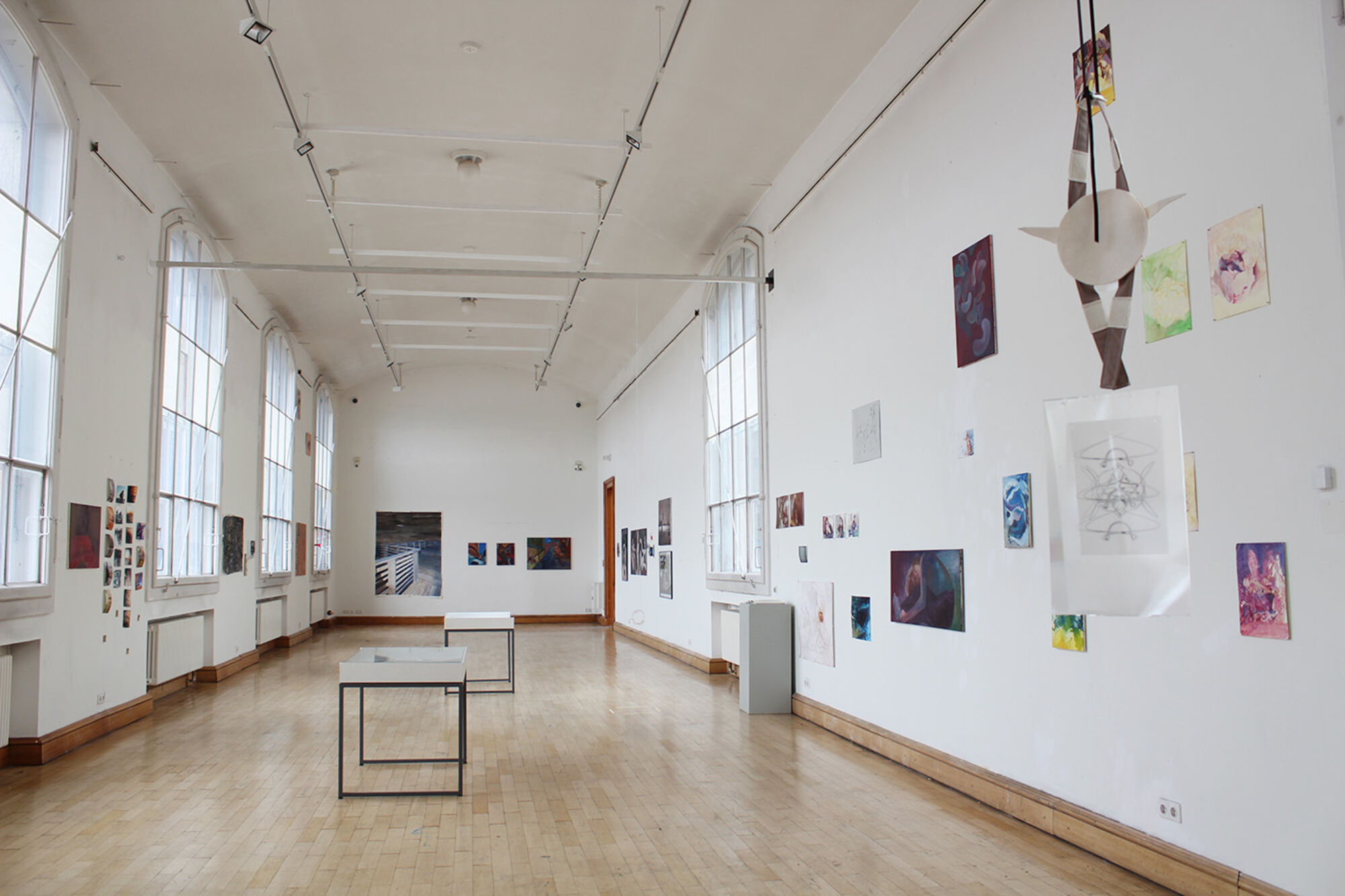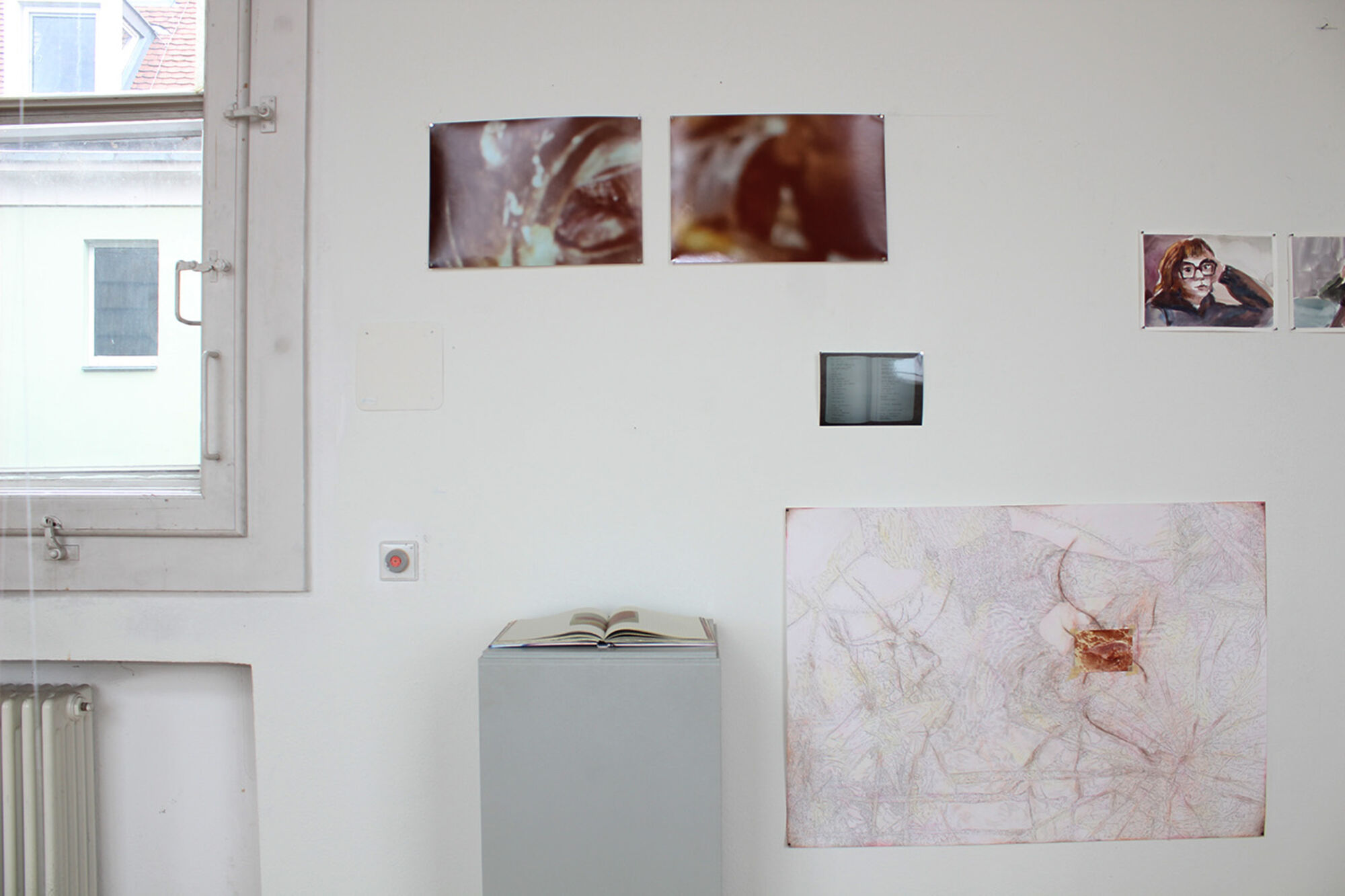Study abroad (Outgoing)
Here you can find information on the topic of studyin abroad within the Erasmus+ Program.
Download area
Here you find important documents, which are required for the Erasmus+ funding.
International Office
Informative
General
Prerequisites for an Erasmus study abroad are regular enrollment at the Dresden University of Fine Arts and the completion of the first year of study.
Please consider planning the stay abroad longer in advance due to application deadlines.
Information events take place regularly every year in December and are announced via email. If you have any questions in advance, please contact the International Office of the Dresden University of Fine Arts.
Our partner universities
Here you can find information about partner universities with which the Dresden University of Fine Arts has concluded an Erasmus cooperation agreement (inter-institutional agreement). If you are interested in studying abroad at another university not listed here, please contact the International Office of the Dresden University of Fine Arts.
An overview of all partner universities, ordered by field of studies and further information you can find here.
Belgium: Académie royale des beaux-arts de Bruxelles (Brüssel)
Bulgaria: National Academy of Art (Sofia)
Denmark: Funen Art Academy (Odense), The Royal Danish Academy of Fine Arts (Kopenhagen)
Finland: Academy of Fine Arts (Helsinki)
France: École nationale supérieure des Arts Décoratifs (Paris), Ecole Nationale Supérieure des Beaux Arts (Paris), École supérieure d'art d'Aix-en-Provence, École supérieure des beaux-arts de Nîmes, Haute école des arts du Rhin (Strasbourg), Institut Supérieur des Beaux Arts de Besançon/Franche Comté (Besançon), Ecole Superieure d'Art et de Design d'Orleans, École supérieure des beaux-arts Tours Angers Le Mans (Angers), Ecole Superieur dÀrt et de Design Toulon
Greece: Athens School of Fine Arts
Italy: Fine Arts Academy of Ravenna (Ravenna), Accademia di Belle Arti di Venezia (Venedig), Accademia di Belle Arti di Firenze (Florenz), Accademia di Belle Arti di Lecce (Lecce), Fondazione Accademia di Belle Arti "P. Vannucci” (Perugia), Accademia Santa Giulia (Brescia), Accademia di Belle Arti di Roma (Rom), Accademia di Belle Arti di Brera (Mailand)
Croatia: Universität Zagreb
Latvia: Art Academy of Latvia (Riga)
Lithuania: Vilnius Academy of Arts (Vilnius)
Netherlands: University of Applied Sciences (Groningen), Amsterdam University of the Arts
Austria: Universität für angewandte Kunst (Wien), Akademie der Bildenden Künste (Wien), Universität für Künstlerische und Industrielle Gestaltung Linz
Poland: Akademia Sztuk pięknych w Gdansku (Danzig), Nicolaus Copernicus University in Torun, Akademia Sztuk Pięknych w Krakowie (Krakau), The Eugeniusz Geppert Academy of Art and Design (Wrocław), Academy of Fine Art in Łódź, Academy of Fine Arts in Warsaw (Warschau), Akademia Sztuki w Szczecinie (Stettin)
Serbia: University of Arts (Belgrad)
Slovakia: Academy of Fine Arts and Design (Bratislava)
Spain: Universitat de Barcelona (Facultat de Belles Arts), Universidad Nebrija (Madrid), Universidad de La Laguna (Teneriffa), Universidad de Castilla-La Mancha (Cuenca)
Czechia: Brno University of Technology (Brünn), Univerzita Jana Evangelisty Purkyně v Ústí nad Labem, University of Ostrava , Academy of Fine Arts in Prague (Prag),
Turkey: Necmettin Erbakan Üniversitesi (Konya), Mimar Sinan Fine Arts University (Istanbul), Dokuz Eylül Üniversitesi (Izmir)
Hungary: Hungarian University of Fine Arts (Budapest)
Partner universities beyond the Erasmus+ programme:
Switzerland: Zürcher Hochschule der Künste, HKB Bern Academy of the Arts (no Erasmus+ Grant, but SEMP)
Israel: Bezalel Academy of Arts and Design(Jerusalem)
Bulgaria:
- National Academy of Art (Sofia)
France:
- École nationale supérieure des Arts Décoratifs (Paris),
- Ecole Nationale Supérieure d'Arts et Techniques du Théâtre (Lyon)
- Ecole Superieur d’Àrts Appliqués La Martinière Diderot (Lyon)
Italy:
- Accademia di Belle Arti di Venezia (Venedig),
- Accademia di Belle Arti di Firenze (Florenz),
- Fondazione Accademia di Belle Arti "P. Vannucci" (Perugia)
Latvia:
- Latvijas Mākslas akadēmija (Riga)
Lithuania:
- Vilnius Academy of Arts (Vilnius)
Netherlands:
- University of Applied Sciences (Groningen)
- Amsterdam University of the Arts
- Hogeschool voor de Kunsten Utrecht - Utrecht School of the Arts (HKU)
Austria:
- Akademie der Bildenden Künste (Wien)
Poland:
- Akademia Sztuk pięknych w Gdansku (Danzig),
- Akademia Sztuki w Szczecinie (Stettin)
- The Eugeniusz Geppert Academy of Art and Design (Wrocław),
- Academy of Fine Arts in Warsaw (Warschau)
- Akademia Sztuk Pięknych w Krakowie (Krakau),
- Academy of Fine Art in Łódź
Romania:
- Universitatea Naţională de Artă Teatrală şi Cinematografică “I.L. Caragiale” (Bucharest)
Slovakia:
- Vysoká škola výtvarných umení v Bratislave (Kunstakademie Bratislava)
Spain:
- Universitat de Barcelona (Facultat de Belles Arts)
- Institut del Teatre de Barcelona
Czechia:
- Akademie múzických umění v Praze (AMU) - Theatre Faculty
- Jan-Evangelista-Purkyně-Universität Ústí nad Labem
Turkey:
- Mimar Sinan Fine Arts University (Istanbul), Dokuz Eylül Üniversitesi (Izmir)
Hungary:
- Hungarian University of Fine Arts (Budapest)
Partnerhochschulen außerhalb des Erasmus+Programms:
Schweiz: Zürcher Hochschule der Künste, HKB Bern Academy of the Arts (keine Erasmus+ Förderung möglich, Förderung über SEMP)
Bulgaria: National Academy of Art (Sofia)
France: Institut national du patrimoine (Département des restaurateurs) - Aubervilliers (St. Denis)
Latvia: Art Academy of Latvia (Riga)
Lithuania: Vilnius Academy of Arts (Vilnius)
Austria: Universität für angewandte Kunst (Wien), Akademie der Bildenden Künste (Wien)
Poland: Akademia Sztuk pięknych w Gdansku (Danzig), Nicolaus Copernicus University in Torun, The Eugeniusz Geppert Academy of Art and Design (Wrocław), Academy of Fine Arts in Warsaw (Warschau)
Slovakia: Academy of Fine Arts and Design (Bratislava)
Spain: Universitat de Barcelona (Facultat de Belles Arts)
Czechia: University of Pardubice (Faculty of Restoration)
Turkey: Mimar Sinan Fine Arts University (Istanbul)
Funding rates & top-ups
The financial support for Erasmus+ stays is based on the different costs of living in the destination countries. Across Europe, the following minimum levels apply to three country groups for study visits:
- Group 1 (600 euros per month): Belgium, Denmark, Finland, France, Ireland, Iceland, Italy, Lichtenstein, Luxembourg, Netherlands, Norway, Sweden.
- Group 2 (monthly 540 euros): Austria, Estonia, Latvia, Cyprus, Czech Republic, Greece, Malta, Portugal, Spain, Slovakia, Slovenia
- Group 3 (monthly 540 euros): Bulgaria, Croatia, Hungary, Lithuania, Poland, Romania, Macedonia, Serbia, Turkey.
Funding through an Erasmus+ scholarship can be combined with BAföG. You can find more up-to-date information on the DAAD website or under BAföG while studying abroad later on this page. Furthermore, you can apply for Top-Ups in the form of one-off and monthly funding sums in addition:
Green Travel:
Starting from the 2025 call, financial support will be calculated based on travel cost allowances, which are staggered by distance. The amount of travel expenses depends on whether environmentally friendly means of transport are used. A detailed overview with exact amounts can be found here.
Social Top Up: 250 EUR / month
Participants with fewer opportunities (Social Top Up eligible):
- Students with disabilities or chronic illness
- Students with child(ren)
- First-time students
- Working students
How to Apply?
The application process is divided into two phases: first, students apply internally within the Dresden University of Fine Arts. If you receive a place for the Erasmus+ funding, you will be nominated and then apply directly to the foreign university. The internal application period within the Dresden University of Fine Arts ends annually on January 5 for application to the winter semester in the same year or the summer semester in the following year.
Application documents must be sent digitally by the deadline with the subject Erasmusbewerbung+WS/SS+year to: international@hfbk-dresden.de and include the following documents:
- Completed application form
- CV
- Letter of motivation (max. 1 page)
- Portfolio (with 5 artistic works)
Selection procedure
Each partner university offers a certain number of places for Erasmus students, which can be awarded in the form of nominations among the applicants. If there are more applicants than places at a particular university, a committee of professors will decide on the nominations on the basis of the application documents. Efforts are made to ensure that all applicants receive a place or at least that their second wish can be fulfilled. Priorities for studying at certain universities should therefore be stated in the application.
By the end of January/beginning of February, all applicants will be informed about their nomination and will be asked to accept or decline their place. Based on the outcome of this procedure, places can be reallocated. Students are therefore first nominated internally by the Dresden University of Fine Arts for certain universities and can then apply to the partner university.
Please note that the start of the semester varies between the universities. Therefore, please inform yourself in time, at the university of your choice, about the application deadlines.
My stay abroad
Formalities of the Erasmus+ funding
You have received an acceptance letter from the partner university? This is how it continues now:
Before your departure
- Participate in the information event for outgoing students (invitation will be sent by mail)
- Send us the form "My stay abroad" by July 15 at the latest for the winter semester and by January 15 for the summer semester.
- You will receive the Grant Agreement, the declaration on honor and the payment slip for review and signature
- Creation of the Learning Agreement via the OLA Dashboard
- The last step is to take an online language test.
- Only after submitting these documents, together with the Confirmation of Arrival signed by the foreign university and the completed OLS language test, the first installment payment (70%) can be made.
A detailed overview of the formalities for Erasmus+ funding before, during and after the stay can be found in our guide. You can find this guide as well as all applications and forms in the download area.
Independent preparation
Some partner universities offer rooms in student dormitories and may also help you find other housing options. Please inform yourself directly on the websites of the partner universities. Some universities offer a so-called buddy, mentor or tutor system - so you could directly ask students on site for help in finding accommodation. On Facebook you can find various groups about the partner university and foreign students in the respective city and country. Here, housing issues are often addressed or even rooms are offered directly. It is also highly recommended to take a person who knows the language and the country with you to sign the contract. You can also ask the International Office of the Dresden University of Fine Arts which students have studied at the respective partner university in the past, contact them directly and possibly get contacts and tips on the subject of finding accommodation.
Within the EU, European health insurance is often sufficient. Nevertheless, it is recommended to arrange an international health insurance. For stays abroad outside the EU, additional insurance is required. Check directly with your insurance company which services are covered abroad.
BAföG while studying abroad, so called ‘Auslands-BAföG’, is available to all students who are generally eligible for BAföG study support funding. It is important to submit the application as early as possible, at least half a year before the beginning of the study abroad at the responsible office. An overview of the responsibilities depending on the destination countries and more detailed information can be found here.
In addition, there are some supplements that can be applied for separately. These include supplements for demonstrably necessary tuition fees, travel costs within Europe for one outward and one return trip of 250 euros each, outside Europe for one outward and one return trip of 500 euros each, for possible additional costs of health insurance for students, and for higher living costs for students outside the EU and Switzerland.
Please inform yourself in advance, preferably already before the internal application at the Dresden University of Fine Arts, about required language skills for studying at a particular university. At some universities, knowledge of English is not sufficient and a certain language level in the respective national language is required.
At the beginning of the stay abroad, a language test must be completed on the OLS online platform as part of the Erasmus+ funding. In addition, online language courses are offered during the stay abroad. The language tests are obligatory. The language level achieved is not decisive for the funding. Nevertheless, we recommend that you take advantage of the extensive range of courses on offer.
Language support in the Erasmus+ Online Language Support (OLS) program is available through the EU Academy platform for students going abroad from the academic year 2022/23. You can voluntarily take an OLS language test and course online before, during and after your stay abroad and test your knowledge in as many languages as you like and take as many courses as you like. Please note: The OLS platform is currently under construction and will be expanded to include more languages.
Click here for Online Language Support!
Since the system is not completely self-explanatory, you will find instructions here. If you have any questions or technical difficulties, please contact the Help Center of the European Commission.
OLS, the Online Language Support, offers more than just placement tests and the regular A1-B2 courses to accompany your learning process alongside your mobility:
- "Let’s Go Further": Reinforces knowledge from language modules with integrated practice activities.
- "Let’s Play": Encourages playful use of new language skills.
- "Let’s Explore": Provides cultural intelligence for thriving in the mobility country (Spotlight section).
- "How Do We Say…?": Explores linguistic, phonetic, or cultural aspects directly in the module.
- Boosts: Personalized extra activities based on a learning questionnaire.
From 2025
- "Let Us Tell You a Story": Engages learners in storytelling using activities like comics and audio.
- "I Want to Know": Builds metacognitive skills to support independent learning.
(available in French, German, English, Italian, Spanish A1-B2, other languages A1-A2)
Information about your host country, the current security advice and visa regulations can be found on the homepage of the German Foreign Office. Please keep yourself informed about the current security situation in your host country or region. As a precaution, make a note of the telephone and emergency number of the nearest German mission abroad (save it in your cell phone if necessary). You can find the telephone numbers on the website of the respective German mission abroad.
You should also - if you have not already done so - register on the crisis precaution list for German citizens of the German Foreign Office (ELEFAND). The German mission abroad will use this list to send out security advices if necessary (so-called "Landsleutebrief").
The DAAD provides a leaflet on security precautions for scholarship holders on its homepage.
Possibilities of extension
If you decide during your Erasmus semester to extend it for another semester, this is generally possible, provided you have not already spent 12 months abroad. Please contact the International Office of your home and host university as early as possible. The extension will be decided on a case-by-case basis, depending on whether there are still study places available at the specific foreign university and places that can be funded by Erasmus+ for the following semester.
Based on the experience, an extension from the winter semester to the following summer semester is usually rather possible than from summer to winter semester, since it is the same academic year and Erasmus funding is tied to it.
Changes to the travel period must be notified at least 30 days before the planned end of the stay aborad!
Recognition of achievements abroad
For the recognition of study achievements abroad, it is recommended to consult with the responsible teachers in advance when filling out the Learning Agreement, to what extent ECTS points can be recognized. This is the only way to be sure that the courses passed during the Erasmus semester will be recognized afterwards at the Dresden University of Fine Arts.
The credit points collected abroad can be automatically recognized after your stay if you have submitted the application for recognition together with the Learning Agreement and provide proof of the achievement of the credits by handing in a Transcript of Records.
If you have completed coursework abroad that is not included in our curriculum, this can be recognized as additional work.
You can find detailed information on the recognition process here




